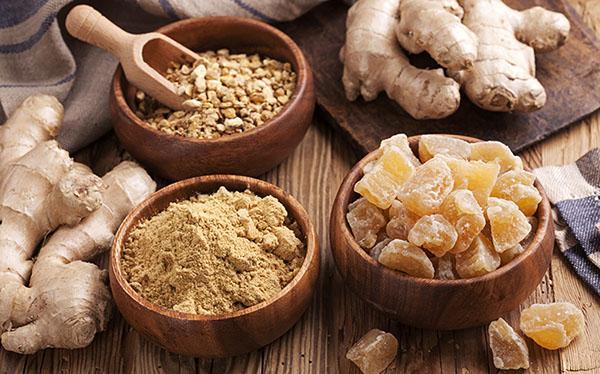Ginger during pregnancy and breastfeeding
 The healing properties of ginger have long been used by folk medicine, and the burning, refreshing taste of rhizomes is highly valued by culinary experts. But for all the usefulness of the product, expectant mothers and doctors are concerned about the question: "Will ginger harm during pregnancy?"
The healing properties of ginger have long been used by folk medicine, and the burning, refreshing taste of rhizomes is highly valued by culinary experts. But for all the usefulness of the product, expectant mothers and doctors are concerned about the question: "Will ginger harm during pregnancy?"
How can a plant with many beneficial properties become dangerous? During pregnancy, the female body undergoes significant changes. Metabolism is adjusted to the needs of the growing fetus, preferences and habitual perception of the world change. Any active influence during this period runs the risk of upsetting the delicate balance and causing a violent, not always positive reaction.
When wondering if ginger is possible for pregnant women, a woman, first of all, should listen to her well-being and seek advice from a treating specialist. After all, all innovations, additions to the diet of pregnant women or the intake of bioactive food supplements should be very thoughtful and agreed with the doctor.
Composition and properties of ginger root
Ginger has many truly healing properties, which are determined by its complex composition, in which there are about four hundred various compounds.

- up to 70% of the tsingiberen ginger named after the Latin name of ginger;
- up to 3% essential oils;
- a large number of vitamins, including ascorbic acid, B1, B2, B3, B4, B5, B9, A, E and K;
- starch and sugar;
- many essential amino acids;
- up to 1.5% gingerol, also first found in ginger and named after the plant.
Thanks to such an extensive list of biologically active substances, ginger has a bactericidal, anti-inflammatory, sedative, diuretic, tonic and analgesic effect.
But is ginger possible during pregnancy? For women preparing to become a mother, ginger root can also be useful because it has:
- to strengthen the immunity that is extremely necessary during the period of bearing a child;
- gently regulate blood pressure, along the way, have a beneficial effect on the state of blood vessels and blood composition;
- stimulate digestion and absorption of nutrients from food;
- remove toxins and relieve swelling;
- relieve the painful symptoms of toxicosis for a pregnant woman;
- give a charge of vivacity and strength for the whole day.
 These and other properties of ginger during pregnancy can greatly facilitate the baking of this difficult period in a woman's life. However, it is important to remember that you should not abuse ginger root, drinks based on it and spicy seasonings. Only in this case, burning, refreshing ginger can only benefit from the first days of waiting for the baby until the very birth.
These and other properties of ginger during pregnancy can greatly facilitate the baking of this difficult period in a woman's life. However, it is important to remember that you should not abuse ginger root, drinks based on it and spicy seasonings. Only in this case, burning, refreshing ginger can only benefit from the first days of waiting for the baby until the very birth.
Ginger for early pregnancy
In the first weeks of pregnancy, the body undergoes serious restructuring. It was at this time that the overwhelming majority of women notice nausea rolling in the morning. Ginger included in the daily menu in early pregnancy will help relieve symptoms that bother a woman. The fact is that the pungent taste of ginger root and essential oils gave the product the ability to suppress vomiting. It is enough to eat a slice of fresh ginger or chew candied fruit from dried root, the state of health is significantly improved.
 It helps to relieve the urge to vomit infusion of ginger root with honey. But ginger tea during pregnancy helps not only to cope with attacks of nausea, it removes toxins and excess fluid from the body, and has a powerful effect on digestion and metabolism.
It helps to relieve the urge to vomit infusion of ginger root with honey. But ginger tea during pregnancy helps not only to cope with attacks of nausea, it removes toxins and excess fluid from the body, and has a powerful effect on digestion and metabolism.
If the beginning of pregnancy occurs in the autumn-winter period, a woman is faced with a weakened immune system and frequent colds. They do not reflect in the best way on the condition of the mother and on the future health of the fetus. The risk of infections is especially high from 6 to 8 weeks, when the body is actively adapting to a new state for it.
Eating fresh ginger root in early pregnancy allows you to quickly replenish the supply of vitamins and amino acids. The bactericidal, anti-inflammatory and stimulant properties of the product will provide natural protection against seasonal respiratory diseases and help you quickly cope with existing problems.
 A similar effect should be expected from ginger during breastfeeding, when the child's immunity has not yet been formed, and the mother's defenses are working for two.
A similar effect should be expected from ginger during breastfeeding, when the child's immunity has not yet been formed, and the mother's defenses are working for two.
Eating ginger in the 2nd trimester of pregnancy
By the middle of pregnancy, the unpleasant manifestations of toxicosis remain in the past, but ginger, if there is no doctor's objection, can continue to have a positive effect on the female body, supporting immunity and helping to cope with other difficulties of an important life period.
 From 20 to 28 weeks of pregnancy, ginger will become an effective assistant for women prone to anemia. The condition associated with a lack of iron in the body affects digestion, in addition, the supply of oxygen to tissues worsens, which affects both the woman's condition and the development of the baby.
From 20 to 28 weeks of pregnancy, ginger will become an effective assistant for women prone to anemia. The condition associated with a lack of iron in the body affects digestion, in addition, the supply of oxygen to tissues worsens, which affects both the woman's condition and the development of the baby.
You can strengthen the immune system, improve digestion and assimilation of food, increase the level of hemoglobin and restore excellent health by using a very small amount of ginger, which is useful during pregnancy.
Ginger in the last third of pregnancy
The main problem of the last trimester of pregnancy is the deterioration of health due to the pressure of the child on the internal organs. This is reflected in the violation of peristalsis, increased gas production and congestion. Not only the gastrointestinal tract suffers, but also the liver, the urinary sphere.
 With constant monitoring by a doctor, ginger can relieve the condition:
With constant monitoring by a doctor, ginger can relieve the condition:
- to establish the digestion of food and the process of defecation;
- reduce spasmodic pain and discomfort from gas accumulation;
- gently relieve swelling.
You can use ginger during late pregnancy or ongoing pregnancy with complications only with the approval of your doctor. This applies to the use of the root as an ingredient in tea or as a condiment for all culinary dishes, pickled appetizers and candied candied root fruits.
The active substances in the root can affect blood pressure, thin the blood and increase the tone of the uterus, which is dangerous for both the woman and the fetus.
Contraindications to taking ginger
Caution in the use of ginger is necessary for healthy women expecting a baby, and especially for those who have chronic diseases that affect the course of pregnancy.
 Contraindications for including ginger in the menu during pregnancy are:
Contraindications for including ginger in the menu during pregnancy are:
- the presence of allergies to food and the ginger root itself;
- hypertension;
- bleeding tendency;
- peptic ulcer and gastritis of various types;
- cholelithiasis;
- toxicosis of the second half of pregnancy.
Consultation with a specialist about taking ginger is required at a later date, in the presence of complications, as well as when prescribing medications, the effect of which is enhanced or leveled out in combination with the components of the root.
Is it possible to breastfeed ginger? A breastfeeding mother is fully responsible for her own health and for the well-being of the baby.Therefore, it is also necessary to coordinate the intake of biologically active products at this stage by a pediatrician. This is especially important if the child has a predisposition to allergies, digestive dysfunction, or other medical conditions.